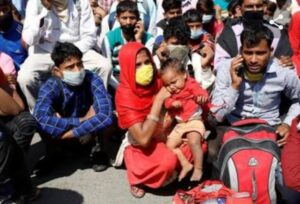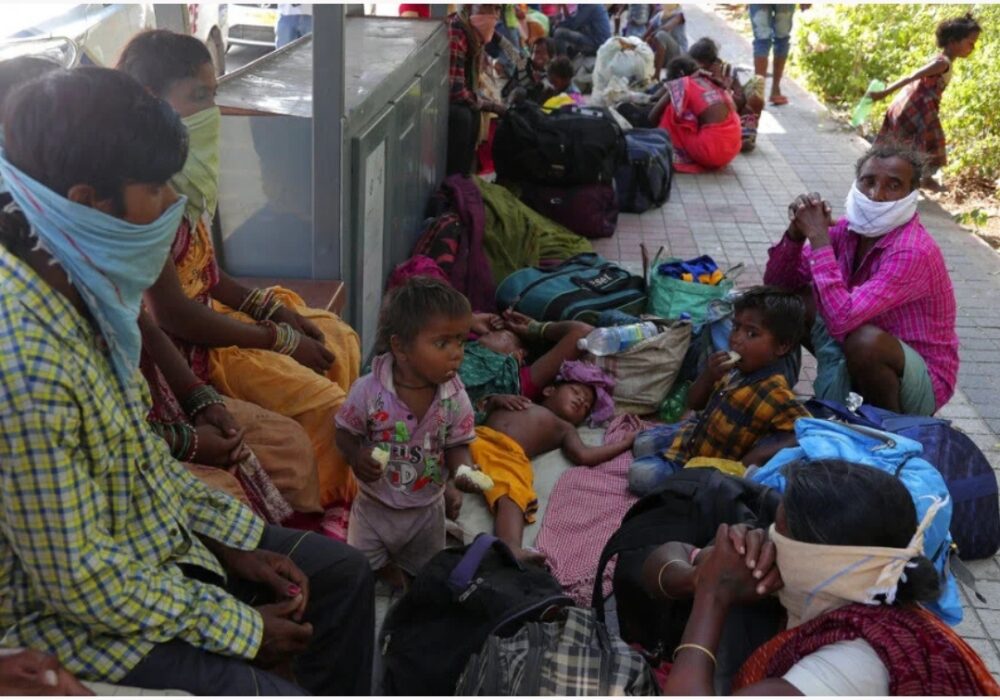As the pandemic envelops the whole world, it becomes harder for the people to survive in these constraints. Apart from demographic loss, economic loss has also taken a blow. The National Income of our country continue to lower and lower after the implementation of the world’s largest lockdown from March onwards.
World Bank has cautioned that the group of emerging economies, which include India, will see a growth decline of 2.5% this year. The Bank also said that the per capita incomes are expected to decline by 3.6%, which will drown millions of people into abject poverty.
The worst hit population in our country is of migrant workers who travelled from their places of destination to their places of origin as they lost their jobs in urban areas. It became impossible for them to survive in their work places without work.

Government took outstanding steps to tackle the ongoing situation through launching government jobs under various schemes like Pradhan Mantri Garib Kalyan Rojgar scheme for migrant workers. It is dedicated to the workers, to the youth and women living in villages. But the efforts, related to it, proved futile as the benefits couldn’t percolate to the lower castes.
However, the situation becomes more critical, when caste discrimination overlaps the economic depression. India’s age-old caste system still prevails in small villages, mostly of, Madhya Pradesh, Bihar, Gujarat and Uttar Pradesh.
The government job programs are mostly allocated by the village headman to upper caste workers. Hence, leaving lower caste workers on the verge of extreme poverty.
Thus, India is not only dealing with economic depression but also countering social restraints on many fronts.
A worker named Raju Banskar who lives in the village of Aston, in Madhya Pradesh, has faced similar situation. He worked in a building site in New Delhi, which provided him enough money to survive in the capital, but as soon as the lockdown was announced, all building sites were shut down, leaving him with no work, which made his mind to travel to his hometown. However, the situation worsened more in his hometown, when he was denied for the job because of his lower caste, according to a print report.
As interviewed by Bloomberg, nine other migrants in several states of India faced exact situation, showing how the pandemic is widening the ever-existing gap between the upper and lower castes.
Chandrasen Singh, additional chief executive officer of the Zila Panchayat, of Tikamgarh district which administers Banskar’s village said the region’s job program is very effective and he hasn’t received any complaints about caste discrimination. He also said that these allegations have no evidences present. According to him, some people have refused to work because wages under government jobs are much lower than the wages they get outside. While some others have ground of hard labour.
The pandemic has destroyed the livelihood worldwide, leaving millions of people from the northern to the southern tip jobless. But the biggest hits are in the emerging economies like that of India, where half of the population is engaged in primary sector. World Bank estimates that India’s lockdown will push 12 million people into sheer poverty, many of which may never recover.
Niranjan Sahoo, a senior fellow at the New Delhi-based Observer Research Foundation stated, “This will have an impact that you will see for many years. Whatever gains we made in last so many years, we might just lose it. “Millions will go back to below the poverty line especially from the lower caste segment,” he further adds.
Manish Kumar, who returned to Tevar village, in the eastern district of Varanasi says caste-based discrimination restarted the moment when he entered the quarantine centre in his village. The upper caste separated them from the Dalits, a group which is considered impure or ‘ashuddha’ from earlier times. He also didn’t get any job under government program and not given any food-aid despite having required documents.

Not only males but females also witness these discriminations. They are often responsible for picking up food and water and some migrant returnees said that they have to wait long hours at the village tap because the upper caste families get access to water first.
Being landless, with no ration card and other documents to get food aid, it’s been hard for Krishna Ahirwar, who returned from New Delhi and lives in Aston village with her husband and toddler. “We’re thinking either to go back to the city,” Ahirwar said. But returning to the city isn’t easy as India is witnessing 2.8 million coronavirus cases.
As the covid-infection keep spiking rapidly since March, social inequities also settled among the people. So not only we have to deal with this issue on an urgent ground, but also to save the population from this social monster which inturns save them from economic crisis.
[zombify_post]



